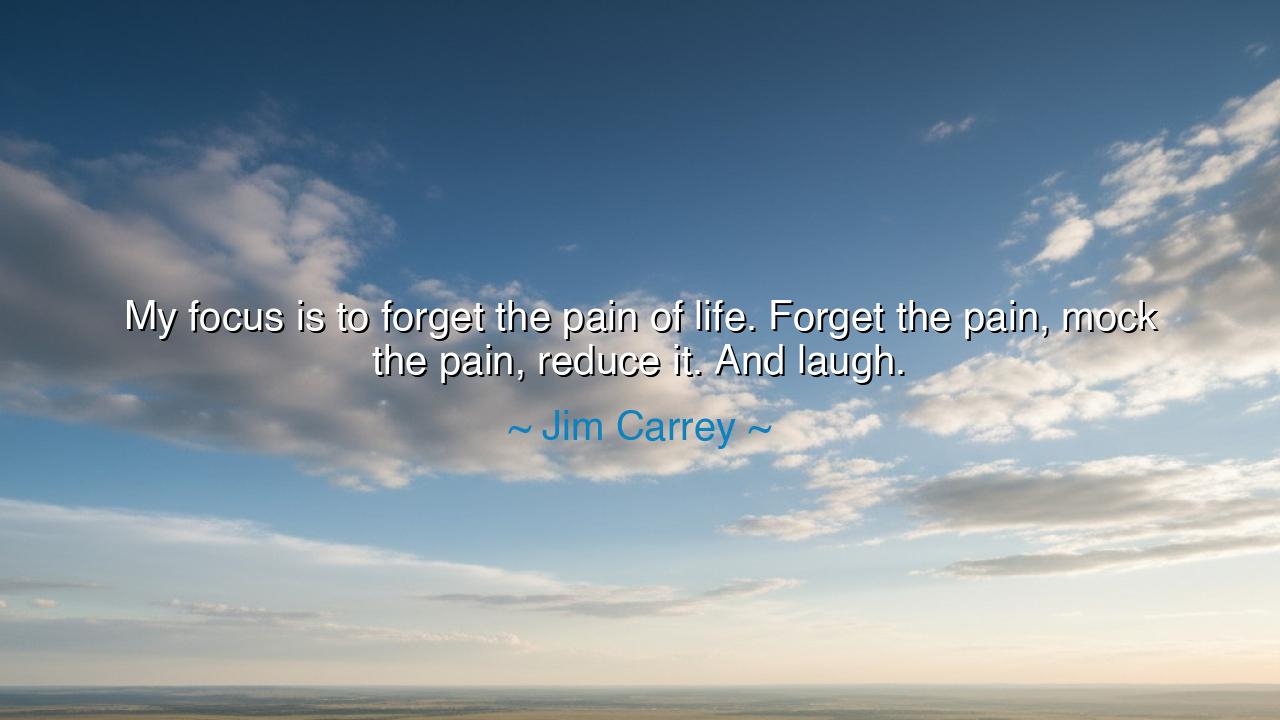
My focus is to forget the pain of life. Forget the pain, mock the
My focus is to forget the pain of life. Forget the pain, mock the pain, reduce it. And laugh.






Jim Carrey, the jester who cloaked sorrow in laughter, once declared: “My focus is to forget the pain of life. Forget the pain, mock the pain, reduce it. And laugh.” In this utterance lies a truth as ancient as the world—that suffering is inescapable, yet the human spirit has the power to transform it. Carrey speaks not as one who denies suffering, but as one who has wrestled with it, chosen to meet it not with despair but with humor. To laugh is to defy the darkness, to refuse to let pain have the final word.
The ancients knew this medicine well. In the theatres of Greece, tragedy and comedy were twin masks of the same truth. One revealed the depth of human grief, the other showed the power of laughter to endure it. Aristophanes mocked the follies of Athens, even amidst war, because he knew that to laugh at pain is to strip it of its dominion. Carrey’s vow to mock the pain echoes this lineage: comedy is not frivolity but resistance, a shield for the soul when the world presses too heavily upon it.
History offers luminous examples of such defiance. Consider the story of Charlie Chaplin, who rose from poverty and hardship to become a master of silent comedy. In films like The Kid and Modern Times, he wove sorrow into laughter, showing the resilience of the downtrodden. Chaplin’s tramp was often hungry, often beaten down, yet always found a way to smile, to dance, to love. Like Carrey, Chaplin believed in the sacred act of turning pain into laughter, for in laughter, humanity regains its dignity.
Yet Carrey goes further: he does not only laugh, he reduces pain. This is no denial of life’s wounds, but a conscious shrinking of them, a refusal to let them loom larger than they must. Pain, when mocked, loses its sting. It becomes a smaller foe, one that cannot dominate the heart. The ancients might have called this the wisdom of proportion: to remember that even the heaviest sorrow is not the whole of life, and that joy can still be chosen.
There is, too, a heroic quality in his words. To forget the pain is not weakness, but an act of survival. To mock it is not cruelty, but courage. And to laugh is to lift the spirit not only of oneself but of others. Laughter shared is pain divided, and through comedy, Carrey, like the clowns and fools of old, becomes both healer and prophet. For the fool is never only foolish—he is the one who sees pain clearly and dares to make light of it, thereby teaching the people how to live.
The meaning of this quote, then, is both personal and universal. Personally, Carrey reveals his own path of resilience: a choice to overcome hardship with humor. Universally, he offers a model for all of humanity: though we cannot escape suffering, we can change how we meet it. Pain may wound the body, but laughter preserves the soul. Thus, Carrey’s creed is not mere jest—it is a philosophy of life, forged in sorrow yet shining with joy.
The lesson is clear: when pain comes—and it always comes—do not surrender to it. Forget it when you can, mock it when you must, reduce it by seeing it as small compared to the vastness of life, and above all, laugh. For laughter is rebellion against despair, and in that rebellion lies freedom.
Practical actions follow. Seek humor daily, even in darkness. Surround yourself with those who make you laugh, and be such a person for others. When hardship rises, shrink it with perspective, mock it with wit, and deny it the power to consume you. For as Carrey teaches, laughter is not escape—it is victory.
O seeker, remember this wisdom: pain is inevitable, but laughter is eternal. Forget, mock, reduce, and laugh, for in these acts lies the courage to live fully, and to pass through sorrow without being broken.






AAdministratorAdministrator
Welcome, honored guests. Please leave a comment, we will respond soon